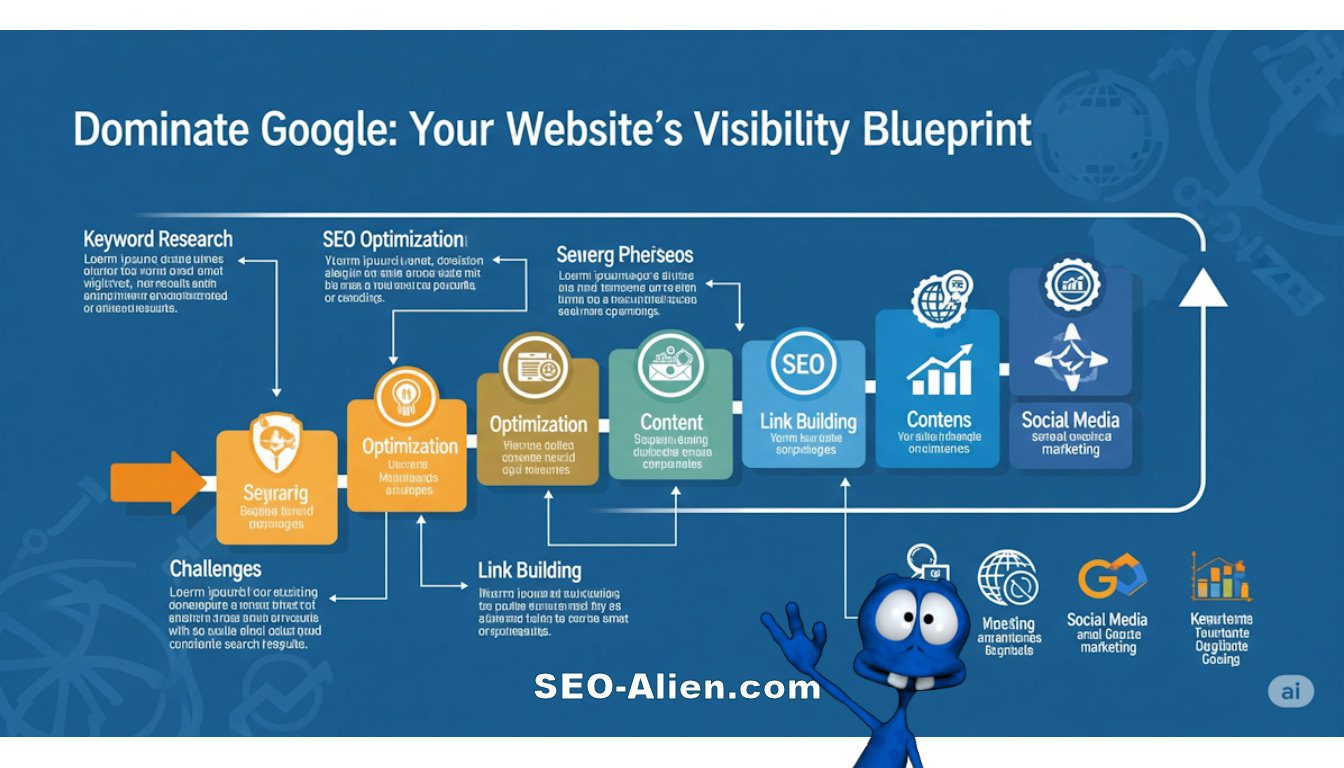This guide is your roadmap to dramatically increasing your website's online visibility, ensuring it gets the attention it deserves from search engines and, more importantly, from your ideal audience.
Image created using imagine.art
Why Online Visibility Isn't Optional Anymore
Think of Google as the world's biggest librarian. When someone asks a question, Google wants to provide the most relevant, authoritative answer. If your website isn't optimized to be that answer, you're missing out on a massive stream of potential customers, clients, or readers. Increased visibility means:
- More Organic Traffic: The holy grail of website growth. People finding you naturally through search engines, not paid ads.
- Higher Brand Authority: Being on the first page of Google signals trust and expertise to your audience.
- Greater Conversions: More relevant visitors mean more opportunities for sales, leads, or engagement.
The Visibility Blueprint: Actionable Strategies
Ready to stop being a secret and start being a superstar? Here are proven strategies to boost your online visibility:
1. Become a Keyword Master (Not a Keyword Stuffer!):
This is foundational. What words and phrases do your potential customers type into Google when looking for what you offer?
- Research, Research, Research: Use tools like Google Keyword Planner, SEMrush, or Ahrefs (even free versions offer insights) to identify high-volume, relevant keywords with manageable competition. Focus on long-tail keywords (e.g., "best eco-friendly dog food for puppies" instead of just "dog food") – they have less competition and attract highly specific searchers.
- Intent is King: Don't just look at what people search for, understand why they're searching. Are they looking to buy? Learn? Compare? Tailor your content to their intent.
- Strategic Placement: Naturally weave your chosen keywords into your page titles, meta descriptions, headings (H1, H2, etc.), and throughout your content. Remember, readability comes first!
2. Content is Your Crown Jewel: Quality Over Quantity:
Google loves fresh, valuable, and comprehensive content. Don't just write for search engines; write for your human audience first.
- Solve Problems: What questions do your customers frequently ask? What challenges do they face? Create content that provides in-depth solutions. Think blog posts, ultimate guides, how-to articles, FAQs, and even engaging videos.
- Be the Authority: Go deeper than your competitors. If they have a 500-word article, aim for 1500 words or more, packed with actionable advice and unique insights.
- Regular Updates: Keep your content fresh. Regularly update old articles with new information, statistics, and examples. This signals to Google that your site is active and relevant.
3. Technical SEO: The Unseen Powerhouse:
This is about making your website easy for search engine crawlers to understand and index. Don't let the "technical" scare you – many aspects are straightforward.
- Mobile-First Indexing: Google primarily uses the mobile version of your website for indexing and ranking. Ensure your site is fully responsive and offers a seamless experience on all devices.
- Site Speed is Crucial: A slow website frustrates users and search engines. Use tools like Google PageSpeed Insights to identify and fix speed bottlenecks.
- Structured Data (Schema Markup): This code helps search engines understand the context of your content (e.g., is it a recipe, a product, an event?). This can lead to rich snippets in search results, making your listing stand out.
- XML Sitemap: Ensure you have an updated XML sitemap submitted to Google Search Console. This tells Google about all the important pages on your site.
4. Build a Strong Backlink Profile: The Vote of Confidence:
Backlinks (links from other reputable websites to yours) are like votes of confidence. The more high-quality, relevant backlinks you have, the more authority Google perceives your site to possess.
- Earn, Don't Buy: Focus on earning natural backlinks through valuable content that others want to reference.
- Guest Blogging: Offer to write high-quality content for other relevant websites in your industry, including a link back to your site.
- Broken Link Building: Find broken links on other websites and suggest your relevant content as a replacement.
- HARO (Help a Reporter Out): Respond to journalist queries that align with your expertise, often leading to mentions and backlinks.
5. User Experience (UX): Happy Users, Happy Google:
Google prioritizes websites that provide a great user experience. If users bounce quickly, it signals low quality.
- Intuitive Navigation: Make it easy for visitors to find what they're looking for.
- Clear Calls to Action: Guide users on what you want them to do next.
- Engaging Design: A visually appealing and well-organized website keeps users engaged.
- Minimizing Pop-ups: While sometimes necessary, excessive or intrusive pop-ups can deter users.
Measuring Your Progress: The Key to Continuous Growth
You can't improve what you don't measure. Regularly monitor your website's performance:
- Google Analytics: Track traffic, bounce rate, time on page, and conversion goals.
- Google Search Console: Monitor your search performance, identify indexing issues, and see which keywords are driving traffic.
By consistently applying these strategies and analyzing your results, you'll not only see your website's online visibility soar but also build a powerful, sustainable online presence. Stop being a secret and start dominating your niche on Google!
About the Author:
The SEO-Alien is a project started in 2009 regarding all things online marketing. The site started out more of a diary of predictions, suggestions and references to things I frequently used for online marketing... before social media marketing was even an option.
I hope you find the information and tools presented here useful and something worth sharing with others.
If there is anything else about online marketing or any online advertising strategy you think would be helpful, please let me know.




.png)
